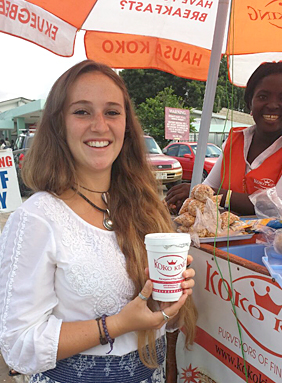
Tich Changamire, physician and public health scientist, received his MBA from the Stanford Graduate School of Business in 2015.
Stanford Seed Student Programs
Today's students become tomorrow's leaders who will set the agenda and prioritize social and economic issues according to their experiences and world view.
Seed's programs introduce students to the challenges and opportunities of doing business in developing economies, and are designed to inspire current Stanford students in becoming globally engaged citizens and leaders.
Application Information
The application for summer 2016 internships is now closed.
Register to get notified of upcoming opportunities.
What You Will Need For The Application
Your Contact Information
Summary of Your International Experience
Answer To Three Essay Questions (500 words or less per essay):
- What opportunities and challenges do you anticipate encountering while serving as an intern?
- How do you expect this internship to further your educational and professional goals.
- Describe the expertise that you can offer a company and that you would use in the Seed internship experience.
Resume (upload as PDF)
Unofficial Transcript (upload as PDF)
Two References
- Provide contact information for two individuals who will be able to speak about you with Seed staff (include their names, short description of the context in which you know them; and email and phone).
- One of your references must be from a Stanford faculty member or lecturer familiar with your academic work.
Seed offers structured engagement opportunities between students interested in global issues of poverty and African companies participating in Seed's Transformation Program (STP).
STANFORD SEED INTERNSHIPS
If you are a degree-seeking, full-time graduate student, undergraduate student, or graduating senior at Stanford University, you are eligible to apply for a Stanford Seed internship.
Internships are arranged by Seed staff who will match the needs of host companies in Africa with the skill sets of applicants. Project scope is tailored to the duration of internships, typically 8 or more weeks.
In addition to gaining work experience in a developing economy, your stay in Africa will enrich your life and promote deeper understanding of business within the context of poverty alleviation.
Missed the Seed Student Programs Info Sessions for Summer 2016? Watch now.
Highlights of the info session held Jan 19, 2016:
Students talk about their 2015 internship experiences in Africa.
Starting at 3:09, 2014 interns discuss their experiences in Africa.
Your Benefits
Interns receive a stipend, airfare and housing.
Your Responsibilities
In addition to all work assigned as part of the internship, you will complete internship reports as requested and agreed upon with Seed staff.
Be aware that preparations for international internships are time-consuming. Allow sufficient time to complete the following pre-departure requirements:
- Attend mandatory international preparation workshop.
- Complete pre-departure forms and obtain valid travel documents such as passport and visa.
- Obtain required immunizations and documentation thereof.
- As a finalist, interview with Seed staff and Seed volunteers as part of the application process and—after selection—to coordinate all logistic and programmatic details of your internship.
Selection Criteria
In evaluating your application, we pay particular attention to:
- Your record of academic and employment accomplishments.
- Your demonstrated ability to work both collaboratively and independently in a cross-cultural context.
- Your interest in gaining work experience in a developing economy.
- Your skill set with regard to the needs of potential host companies in Africa.
Finalists will be interviewed. Internship begins no later than July, 2016.
STANFORD SEED DESIGN THINKING WORKSHOPS
Workshops are offered in partnership with the Stanford Africa Entrepreneurship Network and typically take place in October, February, and April. Students present their findings via video conference to CEOs.
Register to get notified of upcoming opportunities.
On Location in Ghana
Natalie Gonzales interned Summer 2014 in Africa with Koko King, a Ghanaian company providing convenient and healthy food options through roadside kiosks.

"Overall this whole experience taught me more than I can put into words, but some highlights include learning… basic business management, developing my understanding of human relations in cross cultural settings, the importance of personal relationships and a positive work environment, the value of health (both my own and that of an entire nation)."
—NATALIE GONZALEZ, Stanford School of Engineering
GSB Courses Providing Insights Into Developing Economies
The following courses were designed by GSB faculty and draw on Seed's experience in developing economies:
GSBGEN 514 - Creating High Potential Ventures in Developing Economies by Steve Ciesinski, Howard B. Rosen
FINANCE 381 - Private Equity in Frontier Markets: Creating a New Investible Asset Class by Bill Meehan
STRAMGT 545 - Taking Social Innovation to Scale by Stephen Brown Davis
STRAMGT 547 - Entrepreneurial Opportunities in Developing Economies by Federico M. Antoni, Steve Ciesinski, Howard B. Rosen
STRAMGT 584 - New Business Models in Emerging Markets by Matt Bannick
OIT 273 - Value Chain Innovations in Developing Economies by Hau Lee


